(完整word)外研版初三英语时态复习
(完整word版)外研版九年级英语上册语法知识点汇总.docx
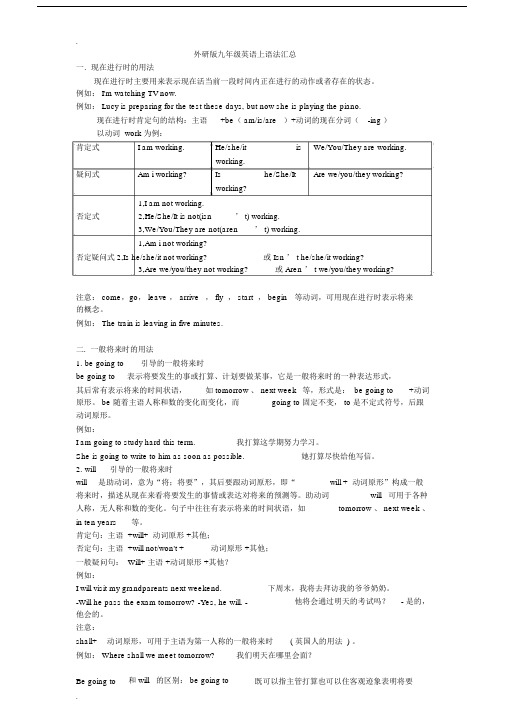
.外研版九年级英语上语法汇总一.现在进行时的用法现在进行时主要用来表示现在活当前一段时间内正在进行的动作或者存在的状态。
例如: I'm watching TV now.例如: Lucy is preparing for the test these days, but now she is playing the piano.现在进行时肯定句的结构:主语+be( am/is/are)+动词的现在分词(-ing )以动词 work 为例:肯定式I am working.He/she/it is We/You/They are working.working.疑问式Am i working?Is he/She/It Are we/you/they working?working?1,I am not working.否定式2,He/She/It is not(isn’ t) working.3,We/You/They are not(aren’ t) working.1,Am i not working?否定疑问式2,Is he/she/it not working?或 Isn ’ t he/she/it working?3,Are we/you/they not working?或 Aren ’ t we/you/they working?注意: come,go, leave , arrive, fly, start , begin等动词,可用现在进行时表示将来的概念。
例如: The train is leaving in five minutes.二. 一般将来时的用法1. be going to引导的一般将来时be going to表示将要发生的事或打算、计划要做某事,它是一般将来时的一种表达形式,其后常有表示将来的时间状语,如 tomorrow 、 next week等,形式是: be going to+动词原形。
九年级外研社英语知识点

九年级外研社英语知识点一、词汇与短语1. 情态动词情态动词(1) can,could:表示能力、请求、许可、可能等;(2) may,might:表示可能、许可、请求等;(3) must:表示必须、责任等;(4) shall,should:表示将会、应该等;(5) will,would:表示意愿、决心、习惯等。
2. 动词时态和语态(1) 一般现在时:表示经常性、习惯性的动作或状态;(2) 一般过去时:表示过去某个时间发生的动作或存在的状态;(3) 现在进行时:表示正在进行的动作;(4) 过去进行时:表示过去某一时刻正在进行的动作;(5) 现在完成时:表示过去某个时间发生的动作对现在造成的影响;(6) 过去完成时:表示过去某个时间发生的动作对过去某一时间造成的影响;(7) 一般将来时:表示将来发生的动作或存在的状态;(8) 陈述语态:主语是动作的执行者;(9) 被动语态:主语是动作的承受者。
3. 名词性从句(1) 主语从句:作主语的从句;(2) 宾语从句:作宾语的从句;(3) 表语从句:作表语的从句;(4) 同位语从句:修饰或说明名词的从句。
4. 名词所有格名词所有格的基本形式是在名词后加“’s”。
5. 状语从句(1) 时间状语从句:表示时间的从句;(2) 地点状语从句:表示地点的从句;(3) 原因状语从句:表示原因的从句;(4) 目的状语从句:表示目的的从句;(5) 结果状语从句:表示结果的从句;(6) 条件状语从句:表示条件的从句;(7) 方式状语从句:表示方式的从句;(8) 比较状语从句:表示比较的从句;(9) 让步状语从句:表示让步的从句。
6. 短语动词(1) 及物动词短语动词:需接宾语才能构成完整意义的动词;(2) 不及物动词短语动词:本身意义完整,无需接宾语。
二、语法1. 反意疑问句反意疑问句由一个陈述句和一个简短的疑问句组成,疑问句部分的人称和时态要与陈述句部分保持一致。
2. 间接引语间接引语是将直接引语变为陈述句或宾语从句。
外研版九上英语五种时态复习

时态复习一般现在时1.表示现阶段经常性,习惯性的动作2. 存在的状态,特征或客观真理常用的时间状语有often,usually,always,every day 等。
例 I get up at 6 o’clock every day.The sky is blue.The sun rises in the east.3.一般现在时的结构①句中有be动词时,用is,am,are②句中无be动词时,用动词原形。
若主语为第三人称单数,动词变成单三。
4.动词第三人称单数变化规则①.一般在词尾加-s。
②.以-o, -s, -x, -sh, -ch结尾的加-es。
③.以辅音字母加y结尾的,变y为i,再加-es。
5.一般现在时的肯定,否定以及疑问句结构一般过去时1.表示过去某个时间发生的事,存在的状态或过去反复发生的动作。
2.构成:①句中有be动词用was 或were;②句中若无be动词,用实意动词过去式的形式。
3. 标志:in+年份,yesterday, last (day, week, month, year), just now, the day before yesterday.4.行为动词的一般过去式变化规则①一般在动词原形末尾直接加上-ed。
如:look-looked。
②以不发音的字母e结尾的动词,去e再加-ed。
如:live-lived。
③末尾只有一个辅音字母的重读闭音节,先双写这个辅音字母,再加-ed。
如:stop-stopped。
④末尾是辅音字母+y结尾的动词,先变y为i,然后再加-ed。
如:study-studied。
5.一般过去时的肯定,否定以及疑问句结构一般将来时1.表示在将来的某个时间要发生的动作或存在的状态2.标志:inthe future, next year, next day, in+时间段,tomorrow3.构成:be going to+动词原形注:“be going to +动词原形”表示即将发生某事或者打算,计划要做某事Will +动词原形注:在疑问句中,当主语是第一人称I或we 时,常用助动词shall4.表示位移的词come, go, start, move, leave, travel等动词常用进行时态表示按计划将要发生的事例The whole family’s going for two months. 全家要去两个月。
外研版初三上学期英语语法总结及复习要点

外研版初三上学期英语语法总结及复习要点一、时态1一般现在时定义:表示经常、习惯或一般性的动作或状态,或表示客观事实。
结构:主语+ 动词原形/第三人称单数形式(+ 其他)。
例子:She always gets up early.(她总是起得很早。
)The sun rises in the east.(太阳从东方升起。
)2一般过去时定义:表示过去某个时间发生的动作或状态。
结构:主语+ 动词过去式(+ 其他)。
例子:She went to the park yesterday.(她昨天去了公园。
)I didn't know him before.(我以前不认识他。
)3一般将来时定义:表示将来某个时间将要发生的动作或状态。
结构:主语+ will/shall + 动词原形(+ 其他)。
例子:I will go to the cinema this evening.(我今晚将去看电影。
)They won't be late again.(他们不会再迟到了。
)4现在进行时定义:表示现在正在发生的动作或正在进行的状态。
结构:主语+ be动词(am/is/are)+ 现在分词(+ 其他)。
例子:She is studying hard.(她正在努力学习。
)They are playing football on the playground.(他们正在操场上踢足球。
)5过去进行时定义:表示过去某个时间正在发生的动作或状态。
结构:主语+ was/were + 现在分词(+ 其他)。
例子:When I called him, he was working in his office.(当我给他打电话时,他正在办公室工作。
)6将来进行时定义:表示将来某个时间正在发生的动作或状态。
结构:主语+ will be + 现在分词(+ 其他)。
例子:This time next week, they will be staying in a hotel in Paris.(下周这个时候,他们将住在巴黎的一家旅馆里。
外研社版九年级英语知识点
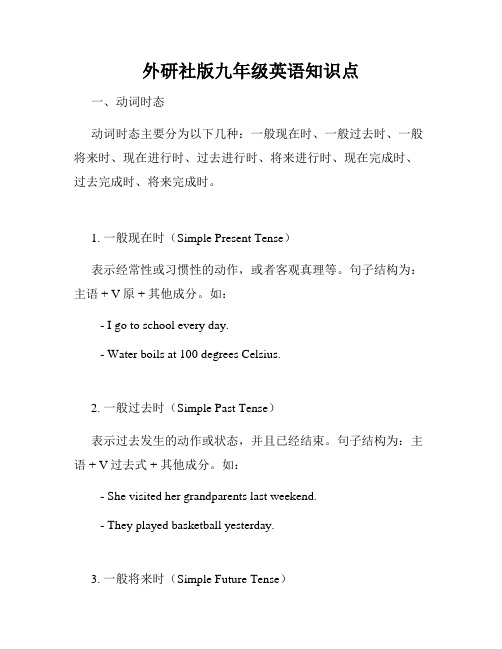
外研社版九年级英语知识点一、动词时态动词时态主要分为以下几种:一般现在时、一般过去时、一般将来时、现在进行时、过去进行时、将来进行时、现在完成时、过去完成时、将来完成时。
1. 一般现在时(Simple Present Tense)表示经常性或习惯性的动作,或者客观真理等。
句子结构为:主语 + V原 + 其他成分。
如:- I go to school every day.- Water boils at 100 degrees Celsius.2. 一般过去时(Simple Past Tense)表示过去发生的动作或状态,并且已经结束。
句子结构为:主语 + V过去式 + 其他成分。
如:- She visited her grandparents last weekend.- They played basketball yesterday.3. 一般将来时(Simple Future Tense)表示将来要发生的动作或状态。
句子结构为:主语 + will + V 原 + 其他成分。
如:- I will buy a new car next year.- They will have a party on Friday.4. 现在进行时(Present Continuous Tense)表示现在正在进行的动作,常与时间状语连用。
句子结构为:主语 + am/is/are + V-ing + 其他成分。
如:- She is reading a book now.- They are playing soccer in the park.5. 过去进行时(Past Continuous Tense)表示过去某一时刻正在进行的动作。
句子结构为:主语 + was/were + V-ing + 其他成分。
如:- He was studying when I called him.- They were watching a movie at that time.6. 将来进行时(Future Continuous Tense)表示将来某一时刻正在进行的动作。
外研版九年级英语(上册)语法知识点汇总

外研版九年级英语(上册)语法知识点汇总. . . .外研版九年级英语上语法汇总一. 现在进行时的用法现在进行时主要用来表示现在活当前一段时间内正在进行的动作或者存在的状态。
例如: I'm watching TV now.例如: Lucy is preparing for the test these days, but now she is playing the piano.现在进行时肯定句的结构:主语+be(am/is/are )+动词的现在分词(-ing )以动词work 为例:肯定式I am working. He/she/it is We/You/They are working.working.疑问式Am i working? Is he/She/It Are we/you/they working?working?1,I am not working.否定式2,He/She/It is not(isn ’t) working.3,We/You/They are not(aren ’t) working.1,Am i not working?否定疑问式2,Is he/she/it not working? 或Isn ’t he/she/it working?3,Are we/you/they not working? 或Aren ’t we/you/they working?注意: come,go,leave ,arrive ,fly ,start ,begin 等动词,可用现在进行时表示将来的概念。
例如: The train is leaving in five minutes.二. 一般将来时的用法1. be going to 引导的一般将来时be going to 表示将要发生的事或打算、计划要做某事,它是一般将来时的一种表达形式,其后常有表示将来的时间状语,如 tomorrow 、next week 等,形式是:be going to +动词原形。
外研版英语英语动词的时态知识点总结含答案百度文库

外研版英语英语动词的时态知识点总结含答案百度文库一、初中英语动词的时态1.The painting by the artist is world-famous , but several years ago, no one could imagine what an important role he in the painting field.A.was playing B.would play C.played D.had played【答案】B【解析】句意:——这位画家的画举世闻名,但几年前,没有人能想象得到他会发挥重要作用在绘画领域。
several years ago是过去的时间点,“他会在绘画领域发挥重要作用”是在该时间点的将来,所以此处应用过去将来时,其构成为:shoud/would+动词原形,结合选项,可知B选项符合题意,故答案选B。
2.She ________on the phone,so I just smiled at her and went away.A.has talked B.was talking C.will talk D.is talking【答案】B【解析】【详解】句意:她正在打电话,所以我只是朝她笑笑就走了。
考查动词时态辨析。
so所以,表结果;根据so I just smiled at her and went away,可知她正在打电话,需用过去进行时,故选B。
3.—I know you ______ to China many years ago. And how long have you ______ in China ?—I don’t remember it exactly.A.come; live B.came; comeC.come; come D.came; lived【答案】D【解析】句意:-我知道你多年前就来中国了。
你在中国住了多久了?-我记不太清了。
外研版九年级下册英语时态综合讲解和巩固训练(附时态图表)

初中英语时态讲解与巩固一般现在时一般现在时通常表示目前阶段经常发生的动作或存在的状态。
通常用“usually, often, every day, sometimes”。
结构:1)be动词。
顺口溜:我用am ,你用are ,is 用于他,她,它, 单数is,复数are.肯定式:主语+ am /is/are +其他否定式:主语+ am/is/are +not + 其他疑问式:Am /Is /Are + 主语+ 其他?简略回答: (肯) Yes,主语+ am/ is /are(否) No,主语+ am /is/are not2)行为动词(实义动词)除主语是第三人称单数外,都用动词原形,主语是第三人称单数时,在动词词尾加-s或-es 。
“动词第三人称单数”的加法即“如何从动词原形变为第三人称单数”1、一般情况加s.2、以o, s, x, ch, sh 结尾加es.3、以“辅音字母+y”结尾改y为i +es句式结构:肯定式:主语+动词原形/动词的第三人称单数否定式:主语+助动词don't/doesn't +动词原形+其他疑问式:Do/Does+主语+动词原形+其他简略回答:(肯)Yes,主语+do/does (否)No,主语+do/does not缩写形式: don't == do not doesn't ==does not 注意:have的第三人称单数为has用法:1.表示事实,现状,性质或经常的,习惯的动作,常与often, usually, always, sometimes, today,every day,once a week, every five minutes, on Sundays等时间状语连用, eg. He has a brother.2.表示普遍真理. eg. The earth goes round the sun.3.表示在现在时间里所发生的一个动作. eg. Here comes the train.4.在时间和条件状语从句中代表一般将来时. eg.I'll go with you if you are free tomorrow.一般现在时用法专练:一、用括号内动词的适当形式填空。
外研版初三英语时态复习

初三英语时态复习【初中英语语法时态】一、一般现在时概念:经常、反复发生的动作或行为及现在的某种状况。
时间状语:always, usually, often, sometimes, every week (day, year, month…), once a week, on Sundays基本结构:①be动词;②行为动词否定形式:①am/is/are+not;②此时态的谓语动词若为行为动词,则在其前加don't,如主语为第三人称单数,则用doesn't,同时还原行为动词。
一般疑问句:①把be动词放于句首;②用助动词do提问,如主语为第三人称单数,则用does,同时,还原行为动词。
二、一般过去时概念:过去某个时间里发生的动作或状态;过去习惯性、经常性的动作、行为。
时间状语:ago, yesterday, the day before yesterday, last week(year, night, month…), in 1989, just now, at the age of 5, one day, long long ago, once upon a time, etc.基本结构:①be动词;②行为动词否定形式:①was/were+not;②在行为动词前加didn't,同时还原行为动词。
一般疑问句:①was或were放于句首;②用助动词do的过去式did 提问,同时还原行为动词。
三、现在进行时概念:表示现阶段或说话时正在进行的动作及行为。
时间状语:now, at this time, these days, etc.基本结构:am/is/are+doing 否定形式:am/is/are+not+doing.一般疑问句:把be动词放于句首。
四、过去进行时概念:表示过去某段时间或某一时刻正在发生或进行的行为或动作。
时间状语:at this time yesterday, at that time或以when引导的谓语动词是一般过去时的时间状语等。
外研社九年级上册英语语法知识点
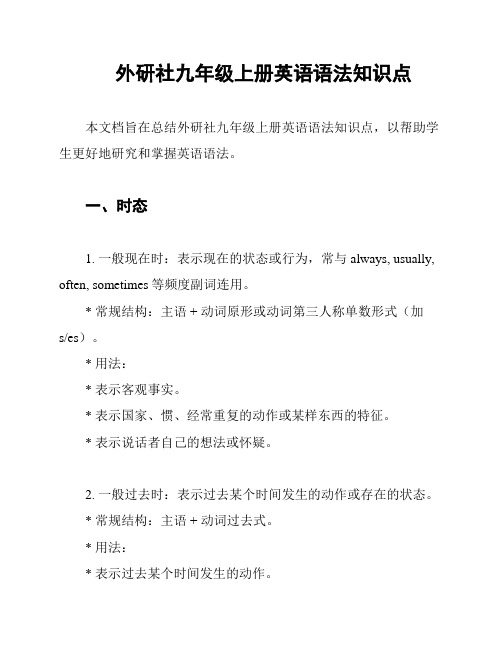
外研社九年级上册英语语法知识点本文档旨在总结外研社九年级上册英语语法知识点,以帮助学生更好地研究和掌握英语语法。
一、时态1. 一般现在时:表示现在的状态或行为,常与always, usually, often, sometimes等频度副词连用。
* 常规结构:主语 + 动词原形或动词第三人称单数形式(加s/es)。
* 用法:* 表示客观事实。
* 表示国家、惯、经常重复的动作或某样东西的特征。
* 表示说话者自己的想法或怀疑。
2. 一般过去时:表示过去某个时间发生的动作或存在的状态。
* 常规结构:主语 + 动词过去式。
* 用法:* 表示过去某个时间发生的动作。
* 表示过去某段持续时间内的状态或行为。
3. 现在进行时:表示现在正在进行或发生的动作。
* 常规结构:主语 + be动词(am/is/are) + 现在分词。
* 用法:* 表示此时此刻正在进行的动作。
* 表示近期安排的行程或事件。
4. 过去进行时:表示过去某个时间正在进行的动作。
* 常规结构:主语 + 过去式的be动词(was/were)+ 现在分词。
* 用法:* 表示过去某个时间正在进行的动作。
二、被动语态被动语态表示动作的承受者,而不是动作的执行者。
被动语态的结构为:be动词(am/is/are/was/were)+ 过去分词。
三、代词代词用以替代名词,包括人称代词、物主代词、指示代词、不定代词等。
1. 人称代词:* 主格:I, you, he, she, it, we, they;* 宾格:me, you, him, her, it, us, them。
2. 物主代词:* 形容词性物主代词:my, your, his, her, its, our, their;* 名词性物主代词:mine, yours, his, hers, its, ours, theirs。
3. 指示代词:* this, that, these, those。
4. 不定代词:* some, any, no, every, each, either, neither。
外研版英语九年级上册知识点总结(精华版)

九年级英语上册知识点总结Module1 Wonders of the world一、重点短语1.wonders of the world世界奇观2.natural wonders自然奇观3.join in = take part in参加;加入(活动)4.agree with sb.同意某人的看法5. agree to do sth.同意做某事6.in one’s opinion依某人看来;按某人的意见7.more than = over多于,超过8. millions of数百万的;数以百万计的9.produce electricity供电10.would like to do sth. = want to do sth.想做某事11.get out of...从....出来12.become grey变成灰色13.look across眺望, 向对面看14.look down to俯视;向下看15.go down下去;下沉;坠落16.look over从(某物上面)看过去:仔细检查17. go through穿过,经历,经受,浏览18.at the bottom of在.....的底部19.on both sides在两边20.in height高度;在高度上21. do an interview with sb.采访某人22.draw a picture of画一副......的图画23.fall away突然向下倾斜24.wait for等候25.dozens of许多26.be famous for以.......而闻名二、固定结构1. sb./sth agrees with sth.某人/某物适应(食物、气候)/符合某物,I don't think the food here agrees with me. 我觉得这里的食物不对我的胃口His explanation agrees with the facts of the situation.他的解释与实情相符。
外研版九年级英语上册Module 1 Wonders of the world 时态总结-word文档

Module1时态总结一.一般现在时1.构成: (1) be: am/is/are (2) do: do/does2.标志词:always, usually, often, sometimes, never, every day /week /month/year/…二、一般过去时态1..构成:(1)be: was/were (2) do: did2.标志词:yesterday, the day before yesterday, three days ago, last ni ght/week/month…, in the past;just now=a moment ago三、一般将来时1.构成:(1)will +be/do (2) be going to +be/do2.标志词:tomorrow, the day after tomorrow, in three days, in (the) future, next week/month/term…, from now on...四、现在进行时1.构成:am/is/are +v-ing2.标志词:now, at the moment, Look! Listen!Be quiet!…3.注意(1)下列这些动词一般不用于现在进行时态的句子中:see, hear, like, love, want, would like, be,have, know, think, forget等(2)有几个瞬间动词可以用现在进行时表将来,如:begin, start, come, go, leave, arrive五、过去进行时1.构成:was/were +v-ing2.标志词:at that time, this time yesterday, then, at that moment, at 8 last night, when sb. did sth.注意在含有when或while引导的时间状语从句的主从复合句中过去进行时的运用:1)主句中的动作先于从句中的动作发生,且进行的时间较长时,主句用过去进行时(从句用一般过去时)。
外研版初三下学期英语语法总结及复习要点
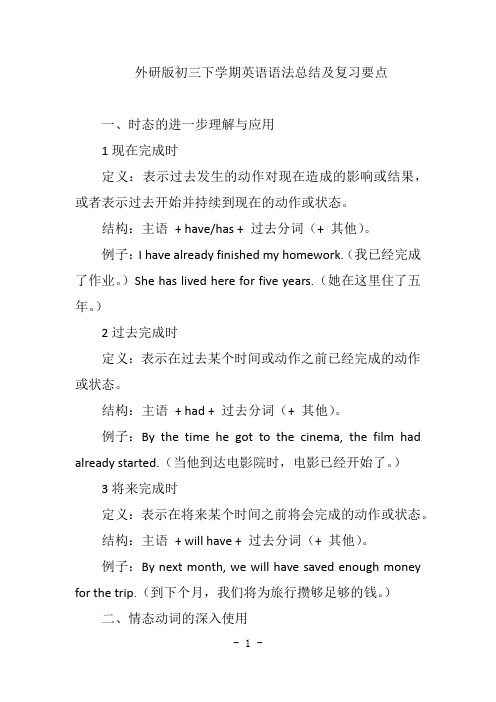
外研版初三下学期英语语法总结及复习要点一、时态的进一步理解与应用1现在完成时定义:表示过去发生的动作对现在造成的影响或结果,或者表示过去开始并持续到现在的动作或状态。
结构:主语+ have/has + 过去分词(+ 其他)。
例子:I have already finished my homework.(我已经完成了作业。
)She has lived here for five years.(她在这里住了五年。
)2过去完成时定义:表示在过去某个时间或动作之前已经完成的动作或状态。
结构:主语+ had + 过去分词(+ 其他)。
例子:By the time he got to the cinema, the film had already started.(当他到达电影院时,电影已经开始了。
)3将来完成时定义:表示在将来某个时间之前将会完成的动作或状态。
结构:主语+ will have + 过去分词(+ 其他)。
例子:By next month, we will have saved enough money for the trip.(到下个月,我们将为旅行攒够足够的钱。
)二、情态动词的深入使用1情态动词的基本用法情态动词用于表示能力、可能性、义务或推测等。
例子:I can swim.(我会游泳。
)He might be late.(他可能会迟到。
)You should help your mother with the housework.(你应该帮妈妈做家务。
)2情态动词与完成时态的结合情态动词可以与完成时态结合,表示对过去情况的推测或假设。
例子:She must have forgotten about the meeting.(她一定忘记了会议。
)I could have passed the exam if I had studied harder.(如果我更努力学习,我本可以通过考试。
九年级外研版英语语法知识点
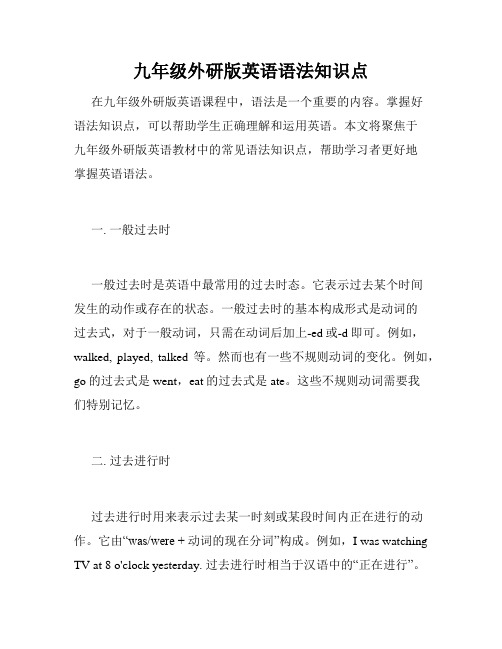
九年级外研版英语语法知识点在九年级外研版英语课程中,语法是一个重要的内容。
掌握好语法知识点,可以帮助学生正确理解和运用英语。
本文将聚焦于九年级外研版英语教材中的常见语法知识点,帮助学习者更好地掌握英语语法。
一. 一般过去时一般过去时是英语中最常用的过去时态。
它表示过去某个时间发生的动作或存在的状态。
一般过去时的基本构成形式是动词的过去式,对于一般动词,只需在动词后加上-ed或-d即可。
例如,walked, played, talked等。
然而也有一些不规则动词的变化。
例如,go的过去式是went,eat的过去式是ate。
这些不规则动词需要我们特别记忆。
二. 过去进行时过去进行时用来表示过去某一时刻或某段时间内正在进行的动作。
它由“was/were + 动词的现在分词”构成。
例如,I was watching TV at 8 o'clock yesterday. 过去进行时相当于汉语中的“正在进行”。
三. just与alreadyjust和already都是英语中常见的副词。
just表示刚刚,用来强调动作发生的时间正好是在说话的时间前不久。
例如,He has just arrived. already表示已经,用来强调动作已经发生在说话前。
例如,She has already finished her homework. 这两个副词的位置一般放在动词之前,表示程度或者改变。
四. Must, Have to与Mustn'tmust和have to都表示“必须”,但用法略有不同。
must表示主观上的主动,have to表示客观上必须。
例如,I must study hard for the exam. The doctor said I have to take medicine three times a day. 在否定句中,must用mustn't表示禁止,have to用don't/doesn't haveto表示没有必要。
外研版-九年级上册英语语法知识点总结大全

外研版-九年级上册英语语法知识点总结大全1. 时态 (Tenses)- 现在时 (Present Simple)- 过去时 (Past Simple)- 将来时 (Future Simple)- 现在进行时 (Present Continuous)- 过去进行时 (Past Continuous)- 将来进行时 (Future Continuous)- 现在完成时 (Present Perfect)- 过去完成时 (Past Perfect)- 将来完成时 (Future Perfect)- 现在完成进行时 (Present Perfect Continuous)- 过去完成进行时 (Past Perfect Continuous)- 将来完成进行时 (Future Perfect Continuous)2. 名词 (Nouns)- 可数名词 (Countable Nouns)- 不可数名词 (Uncountable Nouns)- 可数名词的单数和复数形式 (Singular and Plural forms of Countable Nouns)- 不可数名词的量词 (Quantifiers for Uncountable Nouns)3. 代词 (Pronouns)- 主格代词 (Subject Pronouns)- 宾格代词 (Object Pronouns)- 物主代词 (Possessive Pronouns)- 反身代词 (Reflexive Pronouns)- 相互代词 (Reciprocal Pronouns)- 疑问代词 (Interrogative Pronouns)- 关系代词 (Relative Pronouns)- 不定代词 (Indefinite Pronouns)- 指示代词 (Demonstrative Pronouns)4. 形容词 (Adjectives)- 基本形容词 (Basic Adjectives)- 最高级 (Superlative Adjectives)- 成比例形容词 (Proportional Adjectives)- 不成比例形容词 (Non-proportional Adjectives)- 数量形容词 (Quantity Adjectives)5. 副词 (Adverbs)- 程度副词 (Adverbs of Degree)- 方式副词 (Adverbs of Manner)- 频率副词 (Adverbs of Frequency)- 时间副词 (Adverbs of Time)- 地点副词 (Adverbs of Place)6. 介词 (Prepositions)- 表示位置的介词 (Prepositions of Location) - 表示时间的介词 (Prepositions of Time)7. 连词 (Conjunctions)- 并列连词 (Coordinating Conjunctions)- 从属连词 (Subordinating Conjunctions)- 关联词 (Correlative Conjunctions)8. 冠词 (Articles)- 定冠词 (Definite Articles)- 不定冠词 (Indefinite Articles)- 0 冠词 (Zero Article)9. 动词 (Verbs)- 不及物动词 (Intransitive Verbs)- 及物动词 (Transitive Verbs)- 及物动词和间接宾语 (Transitive Verbs with Indirect Objects) - 及物动词和直接宾语 (Transitive Verbs with Direct Objects) - 及物动词和宾语从句 (Transitive Verbs with Object Clauses) - 助动词 (Auxiliary Verbs)- 基本行为动词 (Basic Action Verbs)- 系动词 (Linking Verbs)- 情态动词 (Modal Verbs)- 动词的时态和语态 (Tenses and Voices of Verbs)10. 从句 (Clauses)- 名词性从句 (Noun Clauses)- 定语从句 (Adjective Clauses)- 状语从句 (Adverbial Clauses)11. 被动语态 (Passive Voice)以上是九年级上册英语语法知识点总结大全。
九年级英语动词的时态外研版

九年级英语动词的时态(外研版)一、初中英语动词的时态1.—you your homework yet?—Yes, I it ten minutes ago.A. Did; do; finishedB. Have; done; have finishedC. Have; done; finishedD. Will; do; finish【答案】C【解析】试题分析:句意:-你做你的家庭作业了吗?-是的,十分钟前我就完成了。
根据yet结合句意可知前一句该用现在完成时;根据ten minutes ago可知后一句该用一般过去时。
所以选C。
考点:考查现在完成时与一般过去时。
2.--you Kate,s letter yet? --Yes, I it for several days.A. Did; receive; have receivedB. Have; received; have hadC. Have; received; have receivedD. Did; receive; have had【答案】B【解析】句意:-你收到凯特的信了吗?-是的,我已经收到好几天了。
本题为现在完成时态,receive动词,收到,暂时性动词。
在肯定的陈述句中,暂时性动词不能和一段时间连用,因而receive改为have, have为持续性动词,had过去分词;可以和for several days 一段时间连用。
故选:B。
3.—There are so many swimmers swimming in the swimming pool.—Yes, and sixty percent _ children.A.isB.areC.wasD.were【答案】B【解析】句意:一一在游泳池里有那么多游泳者正在游泳。
一一是的,而且百分之六十是孩子。
根据谓语are可知此处用一般现在时,故排除CD两项。
此处的sixty percent代指的是百分之六十的游泳者,故谓语用复数形式,故选B。
外研九年级下册知识点
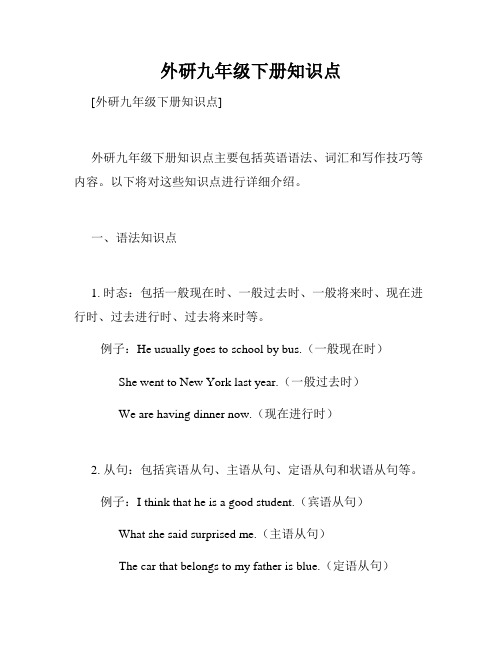
外研九年级下册知识点[外研九年级下册知识点]外研九年级下册知识点主要包括英语语法、词汇和写作技巧等内容。
以下将对这些知识点进行详细介绍。
一、语法知识点1. 时态:包括一般现在时、一般过去时、一般将来时、现在进行时、过去进行时、过去将来时等。
例子:He usually goes to school by bus.(一般现在时)She went to New York last year.(一般过去时)We are having dinner now.(现在进行时)2. 从句:包括宾语从句、主语从句、定语从句和状语从句等。
例子:I think that he is a good student.(宾语从句)What she said surprised me.(主语从句)The car that belongs to my father is blue.(定语从句)3. 被动语态:将主动句转换为被动句,需要使用be动词和过去分词。
例子:The book was written by the famous author.(被动语态)4. 比较级与最高级:用于比较两个或多个事物的程度或大小。
例子:She is taller than her sister.(比较级)This is the most interesting movie I have ever seen.(最高级)二、词汇知识点1. 同义词与反义词:词义相近的词为同义词,词义相反的词为反义词。
例子:happy - glad(同义词)old - young(反义词)2. 词根与词缀:通过添加前缀、后缀或改变词根形式来派生新词。
例子:unlock - lock(词根)unfair - fair(前缀)3. 习惯用语与短语:固定搭配的一组词语,具有特定含义。
例子:break the ice(打破僵局)catch a cold(感冒)三、写作技巧1. 首尾句:开头要引人注意,结尾要给读者留下深刻印象。
外研版英语Module 1 九上 六种时态复习

9. I’ve never ____ a to the Great Wall. a) been b) gone c) seen d) come
请用括号中所给动词的正确形式填空(每
空词数不限)。
1. — _____ _____ (find) the lost boy? Have they found
D. 表示特定的感情色彩。 She is always thinking of others instead of herself . we are looking forward to seeing you again.
5. 现在完成时:
A. 表示动作已发生,这个动作的结果对 现在仍有影响常与already , yet ,now , just, by this time等时间状语连用. He has phoned me about the theft. I have just come back from the U.S. He has turned off the light .
提示: used to 是过去时, 表示过去常 常。 如: I used to take a walk in the morning. 我以前常常早晨散步。
B. 描述几个相继发生过的动作。
I always got up too late, washed my face , had a quick breakfast and hurried to school. C. since 从句常用过去时。 You haven’t changed much since we last met. It’s three days since he went abroad.
—No, not yet. I ______ looked (look) for him
2023年外研版英语九年级中考语法复习Lesson 7六大时态 课件

DCo; finished
B. Are; finishing
C. Have; finished
D. Has; finished( ) 3. Daming
_________ in this place since two years ago.A. have lived B. has
liBved
C. lives
again into the air.
“My friends,” he said, “you have 8.l_e_a_r_n__e_d___a valuable(有价值 的) lesson today. No matter what I 9.__d_i_d_______ to the $100 bill!
一、单项选择题。( ) 1. Tony _________ table tennis every day. A.
noBt play
B. doesn’t play C. don’t play D. play( ) 2. —
________ you __________ your homework? — Sorry, not yet. A.
covers
第叁部分
语法综合训练
After a quick breakfast, I went into the lecture hall in a hurry. A
famous teacher was 1.w__a_s__s_p__e_a_k_i_n_gto the students. He was 2. _w__a_s__h__o_l_d_i_n_gup a $100 bill. Then he 3. _s__a_id_________to the three
- 1、下载文档前请自行甄别文档内容的完整性,平台不提供额外的编辑、内容补充、找答案等附加服务。
- 2、"仅部分预览"的文档,不可在线预览部分如存在完整性等问题,可反馈申请退款(可完整预览的文档不适用该条件!)。
- 3、如文档侵犯您的权益,请联系客服反馈,我们会尽快为您处理(人工客服工作时间:9:00-18:30)。
初三英语时态复习【初中英语语法时态】一、一般现在时概念:经常、反复发生的动作或行为及现在的某种状况。
时间状语:always, usually, often, sometimes, every week (day, year, month…), once a week, on Sundays基本结构:①be动词;②行为动词否定形式:①am/is/are+not;②此时态的谓语动词若为行为动词,则在其前加don't,如主语为第三人称单数,则用doesn't,同时还原行为动词。
一般疑问句:①把be动词放于句首;②用助动词do提问,如主语为第三人称单数,则用does,同时,还原行为动词。
二、一般过去时概念:过去某个时间里发生的动作或状态;过去习惯性、经常性的动作、行为。
时间状语:ago, yesterday, the day before yesterday, last week(year, night, month…), in 1989, just now, at the age of 5, one day, long long ago, once upon a time, etc.基本结构:①be动词;②行为动词否定形式:①was/were+not;②在行为动词前加didn't,同时还原行为动词。
一般疑问句:①was或were放于句首;②用助动词do的过去式did 提问,同时还原行为动词。
三、现在进行时概念:表示现阶段或说话时正在进行的动作及行为。
时间状语:now, at this time, these days, etc.基本结构:am/is/are+doing 否定形式:am/is/are+not+doing.一般疑问句:把be动词放于句首。
四、过去进行时概念:表示过去某段时间或某一时刻正在发生或进行的行为或动作。
时间状语:at this time yesterday, at that time或以when引导的谓语动词是一般过去时的时间状语等。
基本结构:was/were+doing 否定形式:was/were + not + doing.一般疑问句:把was或were放于句首。
五、现在完成时概念:过去发生或已经完成的动作对现在造成的影响或结果,或从过去已经开始,持续到现在的动作或状态。
时间状语:recently, lately, since…for…,in the past few years, etc.基本结构:have/has + done 否定形式:have/has + not +d one. 一般疑问句:have或has。
六、过去完成时概念:以过去某个时间为标准,在此以前发生的动作或行为,或在过去某动作之前完成的行为,即“过去的过去”。
时间状语:before, by the end of last year(term, month…),etc.基本结构:had + done. 否定形式:had + not + done. 一般疑问句:had放于句首。
七、一般将来时概念:表示将要发生的动作或存在的状态及打算、计划或准备做某事。
时间状语:tomorrow, next day(week, month, year…),soon, in a few minutes, by…,the day after tomorrow, etc.基本结构:①am/is/are/going to + do;②will/shall + do.否定形式:①was/were + not; ②在行为动词前加didn't,同时还原行为动词。
一般疑问句:①be放于句首;②will/shall提到句首。
八、过去将来时概念:立足于过去某一时刻,从过去看将来,常用于宾语从句中。
时间状语:the next day(morning, year…),the following month(week…),etc.基本结构:①was/were/going to + do;②would/should + do.否定形式:①was/were/not + going to + do;②would/should + not + do.一般疑问句:①was或were放于句首;②would/should 提到句首。
【专项训练】一、用所给词的适当形式填空1.He______swimming in the river every day in summer. (go)2.It________you are right. ( seem )3. Look, the children______ basketball on the playground. ( play )4. He______to the radio when I came in. ( listen )5.It is very cold .I think it______ . ( rain )6. ---I need some paper . ---I_____ some for you. ( bring )7.I can’t find my pen. Who______it ? ( take )8.He said that he______back in five minutes . ( come )9.I di dn’t meet him. He______ when I got there. ( leave )10.I______my bike, so I have to walk to school. ( lose )11.He______down and began to read his newspaper. ( sit )12.He is very hungry. He_________ anything for three days. ( not eat )13.I______with you if I have time . ( go )14.We will go to the cinema if it______fine. (be )15.I will tell her the news when she______to see me next week. (come)16.---When______you______the car ? ---In 1998. ( buy ) We______good friends since we met at school. (be)18.What______you______ at five yesterday afternoon ? (do)19.The bike is nice . How much______it______? (cost)20. Don't ________(talk). Jim _________(do) his homework..21. ----What _________ you _________(do) ? ----I ___________(close) the windows.22.Look! The windows are__________(close) now.23.They __________(like)the kite very much.24. Where _________ your brother________ (come) from?25. Bill ________ (stay) at home every Sunday.26. I can help you ________ (carry) the things. I'd like something ________ (eat).27. It's better to play computer games than __________(watch) TV.28. What _______ you _______ (do)? I'm a farmer.What _______ you _______ (do) now? I'm ______(put) rice in bags.29. Mike _______ (read) English in the morning. He likes _______(read) very much.30. ______ they ______ (speak) Japanese? Yes, they do.31. Jim ______ (not have) any apples, she wants ______ (get) some.32. Would you like _______ (borrow) it? Does he like ________ (sing)?33. ________(live) in the country ________(be) better than living in the city.34. We _____ (stay) at home on Sundays. He ______ (go) to classes every week.35. Stop _________(talk). Let's begin our class.36. ________ he _______ (have) any sisters? She _______ (say) she's late.37. Where ______ he _______ (work)? He _______ (work) in a factory near here.38.When he met his teacher in the street, he stopped________(say)hello to him.39. She often _______ (buy) things in the shop. We ________ (not want) dear socks.40. We have no problems ___________(work) it out.41. Can you ________ (write) a letter in English?42. I want ___________(take) some books to the classroom .43. Could you ___________(take) it to your room ?44. It's snowing now. We can go out __________ (play) in the snow.45. She __________(like) her new skirt .46. ___________(not jump) too high! Would you like___________(drink) tea ?47. The men ____________(work) near the house now.48. Look! The teachers ___________(talk) to the students.49. The best time _________(visit ) China _______(be) Spring or autumn.50. Can you __________(look) after her ?51. Look! Some boys _______ (have) a football game.52. Where is your father? He ________ (clean) the car.53. The students have fun ___________(learn) English now.54. You must finish __________ (do) your homework today.55. The shop ______ (sell) school things. I must ______ (go) shopping now.56. _______ (be) there any water in the glass?57.What ______ your mother _________ (do)? She _________ (be) a doctor.58. Look! The children __________ ( play) football in the park.59. ______ we _______ (go) to the zoo tomorrow?60. My mother __________ (get) up early every day.61. He ________ (be) born in 1982.62. There was no time for her_________ (open) the box.63. There is nothing for him __________ (worry) about.64. Do you enjoy _________ (eat) bananas? What about _________ (watch)TV?65. The boy is good at _______ (read) maps.66. What __________(be) the date yesterday?67. Please__________ (not climb) the tree. It's dangerous.二、选择最佳答案填空1.We’ll go swimming if the weather______fine tomorrow.A. isB.wasC. will beD.is going to be2.It______five years since he has left for Beijing.A. wasB. has beenC.isD.is going to be3.Please don’t leave the office until your friend______back.A.cameesC.have comeD.will come4.By the end of last year he______about 1500 English words.A. learnsB.learnedC.was learningD.had learned5.Listen ! Someone______in the next room . A.cried B.crying C.is crying D.has cried6.You must tell him the news as soon as you______him. A.see B.sees C.will see D.is seeing7.He told me that he______to see us the next day.esB. cameC. will comeD. would come8.We can’t find him anywhere . Perhaps he______home.A. is goingB. wentC. has comeD. would come9.The teacher told us that the sun______bigger than the earth.A. isB. wasC. has beenD.will be10.Could you tell me where the railway station______?A. wasB. isC. will beD. would be11.We______to the Great Wall several times. A. go B. were going C. have gone D.have been12.It seemed that the old man______for something over there.A. looksB. lookedC. was lookingD. has looked13.He was sure that he______his wallet in the office .A. leftB. would leaveC. had leftD. has left14.You must study hard if you______ want to fail the exam.A. won’tB. don’tC. haven’tD. hadn’t15. I’m afraid you can’t sit here . Sorry , I______know.A. don’tB. won’tC. can’tD. didn’t16. As she______the newspaper , Granny______asleep.A. read , was fallingB. was reading fellC. was reading , was fallingD.read , fell17.--- Jim is not coming tonight . --- But he______ !A. promisesB. promisedC. will promiseD. had promised18. What’s her name? I______. A. forget B. forgot C. had forgotten D. am forgetting三、动词时态能力综合测试1.He often______his clothes on Sundays.A. washing B. washes C. has washed D. wash2.Im Chinese. Where______from?A. do you comeB. you are comingC. you comeD. are you coming3.May______to school.A. never walksB. is never walkingC. walk neverD. never is walking4.We will start as soon as our teacher______ .A. comesB. will comeC. comeD. is coming5.How long ago______playing football?A. have you stoppedB. had you stoppedC. did you stopD. do you stop6.It______ hard when I left my house .A. is rainingB. rainsC. was rainingD. will rain7.I think this question______to answer. A. easy B. is easy C. was easy D. will easy8. Don’t talk so loudly . Your father______. A. sleeps B. is sleeping C. slept D. had slept9.How many people does the doctor know who______of the disease?A. are dyingB. is dyingC. has diedD. dies10.I______my homework now. A. finish B. finished C. have finished D. had finished11.He______for three years.A. has joinedB. has been in the armyC. joinedD. has served the army12.His grandfather______for thirty years.A. diedB. was deadC. has been deadD. has died13.I______ from my brother for a long time.A. not have heardB. have not heardC. have heard notD. do not hear14.Maths, one of the most important subjects, ______always interested him.A. hasB. haveC. areD. is15.Did your brother go to America last year? ______.A. No , he did never go thereB. No , he has never gone hereC. No , he never was thereD. No , he has never been there16.He______ that factory since 1958. A. has left B. has worked in C. has gone fromD. has come to17.Our teacher______to Beijing three times. A. went B. had gone C. has go ne D. has beenst week John______his leg. A. felt and broken B. fell and broke C. feels and breaksD. fallen and broken19.Jack______his thick coat because it was snowing. A. puts on B. put on C. take s on D. took on20.He______the picture on the wall.A. hangedB. hungC. has hangedD. was hanged21.Next month_____twenty five.A. has my sisterB. my sister will beC. my sister shall haveD. my sister is going to be22.You______her again in a few weeks.A. will seeB. have seenC. had seenD. have been seen23. By the end of last term we______English for two years.A. have studiedB. have been studiedC. would studiedD. had studied24.Mrs Brown______in New York for three years before she went to London.A. livedB. had livedC. has livedD. will live25.When we arrived , the dinner______.A. already beganB. has already begunC. had already begunD. was just begun26.I will go home for the holiday as soon as I______ my exams.A. will finishB. finishC. finishingD. finished27.When______, Ill talk to him. A. does Peter come B. Peter will come C. Peter comesD. can Peter come28.My sister______to see me . Shell be here soon.A. comesB. is comingC. had comeD. came29.They said they______our answer the next day .A. had heardB. would hear ofC. would hearD. will hear30.The old man said that light______faster than sound.A. wentB. will goC. travelsD. will travel。
